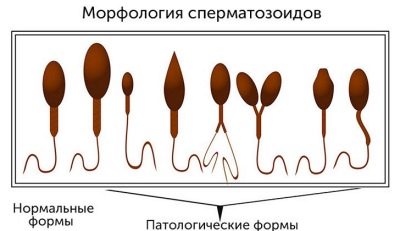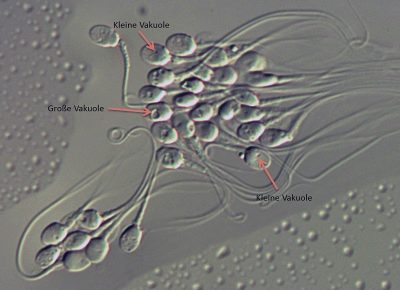All about male fertility
Usually, such terms as "fertility", men begin to think for the first time when conceiving a child after long attempts fails. And many at the same time suspect that the reason lies in a woman, but this is a common misconception. The proportion of male infertility in marriages, according to statistics, is approaching 40%, and therefore questions of male fertility are no less important than questions of female.
What it is?
The concept of "fertility" comes from the Latin word fertilis, which translates as "fertile." In simple terms, this term means the ability of a man to fertilize the female reproductive cell and have children. Fertility in men is determined by the quality of sperm, as well as the state of health of the genital organs, which ensures unimpeded transportation of sperm into the woman’s body, where fertilization and further development of the embryo take place.
Fertile representative of the stronger sex begins to be considered from the moment when puberty begins. It is from this period that the boy begins to develop sperm, which causes him to move to reproductive age. This usually occurs in 10-12 years. The testicles increase in size, they begin the active production of sex hormones, the maturation of sperm. The penis begins to lengthen a little later. From the age of 13, boys are considered potentially fertile, and from the age of 16 they are considered fully fertile.
Fertility in men is a longer term than in women, and it depends little on age, and in 70 years a man can become a dad, which cannot be said about the weaker sex.
Fertile age for a man is the time in which he is able to fertilize an egg. Fertility is high, medium or low.
With low fertilization in a natural way, the task is difficult or impossible. At a normal level of fertility, a man is capable of fertilization on any day while he is at reproductive age. Increased fertility is a rare phenomenon, which is why it is often called a phenomenon. With him, contraceptive measures do not help partners, and often a woman’s pregnancy occurs even while taking contraceptives.
The likelihood of an unplanned pregnancy is higher in couples in which high fertility is observed in both men and women. In practice, this is very rare.
How is it determined?
To determine male fertility is only one way - Conducting a laboratory quantitative and qualitative study of the composition and properties of his sperm. This analysis is called semen. It can be done in almost any reproductive clinic in any region, the cost of analysis is low, and therefore such a survey is considered accessible to all. An analysis is being prepared from days to three days; its results are considered to be highly accurate.
To get reliable results, a man before analysis for 5 days it is necessary to limit sex life and masturbation, for 7 days before the examination it is worth refusing from sunbathing, baths and saunas, alcohol, reducing the number of cigarettes smoked. Sperm is delivered by masturbation or interrupted sexual intercourse, held in a special medical condom.Further, the microscopic method specialists determine numerous indicators that ultimately allow to determine the fertility of a man and highlight the individual index of his fertility.
Male fertility index - what happens?
The index is determined today in two ways:
- Kruger method;
- technique by farris.
The Kruger method implies an assessment of the morphological characteristics of male germ cells, depending on their structure. All cells with altered forms, sizes of tail, head, neck of sperm cell are rejected, only reference cells remain that correspond to the reference properties described by Kruger. Fertile with increased abilities is a man, in whose sperm are such reference germ cells not less than 40-45%.
The detection of at least 15% of such cells indicates the average fertility, and less than 15% about the low ability to reproduce. Kruger criteria are very strict. They do not pass the sex cells, which have even minor defects of the head, neck, tail. The 30% indicator is taken as a basis - it is considered to be the criterion of male fertility.
The Farris method is a method of counting groups of sperm with different mobility. Four types of germ cells may be present in the seminal fluid:
- BUT - the most elite, mobile, active, moving directly at high speed;
- AT - mobile and active, but slightly slower than their type A gather;
- WITH - motile, but not effective cells, which move not forward, but in a circle, in a zigzag, as you please, but not in the direction of the egg;
- D - fixed cells, which can be both alive and dead.
The Farris Index implies that a healthy and fertile man has at least 25% of type A cells or at least 50% of type A and B cells in the seminal fluid together. Most often the Farris index is indicated by numbers. If a man sees in the results of the analysis:
- less than 20.0 - this indicates low fertility;
- 20-25 – this indicates normal fertility;
- above 25.0 - It speaks of high fertility.
A high index of fertility in spermogram means that a man can easily become a dad even after a single sexual intercourse and he will not need any medical intervention for this. We can speak about the standard of dough for a fertile man by average standards.
Normal fertility table based on semen results
Indicator | Norm |
Volume | 2 ml |
Viscosity | No more than 2 centimeters |
Turbidity | Present or "+" |
Red blood cells | Missing or "-" |
White blood cells | Missing or less than 0.3 |
Slime | not |
Liquefaction time | 10 to 40 minutes |
Acidity | 7,1-8,0 |
Number of germ cells | Over 40 million |
Of which are active | Not less than 25% |
Of them still | Not more than 50% |
Of these, morphologically normal by Kruger | 30% or more |
Aggregation | Missing or "-" |
The presence of sperm antibodies | Missing or "-" |
Sperm viability | At least 50% of living cells in the sample. |
The analysis shows only the state of sperm at the current time. He does not answer the question why the man has decreased fertility and what to do about it.
Age features
A very important factor in the assessment of female fertility is age, because it is with its increase that the reproductive function of women will fade away. In men, a clear correlation of fertility with age is not observed, but a decrease in fertility with aging still occurs, it is associated with a decrease in the amount of sex hormones, in particular, testosterone. Also with age increases the risk of gene mutations therefore, spermatozoa can carry DNA with defects, which will increase the likelihood of having a baby with chromosomal abnormalities.
Doctors believe that the best age for fertilization in men is from 16 to 35 years.After 50 years, a gradual hormonal rearrangement occurs, the endocrine system becomes more "lazy", spermatogenesis slows down.
The number of reference germ cells in the male sperm may begin to decline gradually by the age of 35. But with low fertility, a man can fertilize an egg. If a man is more than 40 years old at the time of conception, then a woman is more likely to have a missed abortion, miscarriage, chromosomal abnormalities of the fetus.
But it should be understood that Daddy can be a man in 80 years, if required. And for this it is not necessary that he had an erection and he was able to conduct full sexual intercourse. Modern medicine can take his sperm instrumental by their vas deferens, and if it is of decent quality, IVF, ICSI and other treatment cycles can be carried out using assisted reproductive technologies.
Causes of decline and violations
It is necessary to learn to distinguish between the concepts of "impaired fertility" and "reduced fertility." In the first case we are talking about irreversible changes in the state of health of the man. In the second - about temporary, surmountable.
Male reproductive function is quite vulnerable and can be impaired under the influence of various factors. The reasons may lie both in innate characteristics, genetic abnormalities (this is the most unfavorable option), and in acquired disorders of the reproductive system. The most common causes of reduced male fertility are as follows.
- Diseases of the reproductive organs (varicocele, prostatitis, prostate adenoma and others).
- Disorders related to the transport of sperm along the vas deferens (retrograde ejaculation).
- Infectious diseases - genital infections, venereal diseases, genital herpes, mumps transferred in childhood (infectious parotitis).
- Injuries or congenital defects - refers to injuries or defects of the penis, the testicles.
- Endocrine diseases and diseases that cause a shift in the balance of hormonal levels - diabetes, obesity, hypothyroidism or hyperthyroidism of the thyroid gland. The development of normal sperm and the ability of men to reproduce affects the lack of GnRH, testosterone.
- The presence of antisperm antibodies - this behavior of the immune system is not excluded if an operation was previously performed or there were blunt injuries of the genital organs in which spermatozoa penetrated to where they are not - immunity remembered them forever as "alien bodies" and now seeks to destroy.
Reduce spermograms and show reduced fertility may be transferred to a man's flu or ARVI, if the disease was a couple of months before taking the test. All that is associated with high body temperature, detrimental to the development of sperm and their mobility.
If the disease took place, planning a pregnancy should begin no earlier than after 3 months, and it is also better to do semen after such a period of time. Upgrading to sperm takes up to 90 days.
Features of modern life also have their imprint on the quality of male fertility.
- Ecology - large cities with an abundance of exhaust gases, with dirty air significantly increase the likelihood of reduced fertile functions.
- Stress - Chronic stress leads to excessive production of stress hormones, and therefore decreases the production of sex hormones and sperm quality suffers.
- Work features - contact with radioactive substances, varnishes, paints, toxins and poisons, the presence of vibration in the zone almost always has its echo regarding reproductive male health. A negative factor is considered to be work on the night shift - for a normal hormonal background, sleep is important.
- Bad habits - Smoking, alcohol, drugs. Such hobbies lead not only to the deterioration of the general characteristics of the spermogram, but also to the mutation of the DNA of germ cells.Especially dangerous is smoking marijuana - cannabinoids have a mutagenic effect on male sex cells.
Even men who try to lead an active lifestyle may be among those who have low fertility. Sexual function can suffer from steroid hormones, which athletes use to control body weight, for muscle mass. Reduced fertility is often found in men, who often attend baths, saunas, solariums with pleasure, and also include heated seats in their cars - thermal effects on the scrotum lead to a deterioration of spermogram.
How to increase?
In the overwhelming majority of cases, reduced male fertility is not a verdict, but merely a basis for changing lifestyle, eliminating the influence of the very negative factors listed above. But without a medical examination in any case can not do. Before planning a pregnancy, it is important to cure all detected infections, a man may not even guess about many of them, because they are completely asymptomatic.
In case of varicocele and impaired patency of the vas deferens, surgical intervention helps.
To improve fertility is possible only with strict adherence to the recommendations of the doctor. Basic tips are as follows.
- Taking vitamins and dietary supplements is recommended to improve spermatogenesis and improve sperm quality ("Viardot", "SpermaAktiv" and others). Among them, zinc, selenium, folic acid, and B vitamins are most useful.
- Limiting heat exposure to the genitals and scrotum - refusal to visit baths, saunas, from the use of automobile heated seats, from wearing tight pressure underwear and tight pants.
- Correction of nutrition and lifestyle. In the diet should enter more protein foods (meat, fish, milk). Heavy and exhausting physical activity is contraindicated, while moderate physical activity is encouraged. Rejection of bad habits.
More information about the causes of fertility decline in men tells a specialist in the video below.























